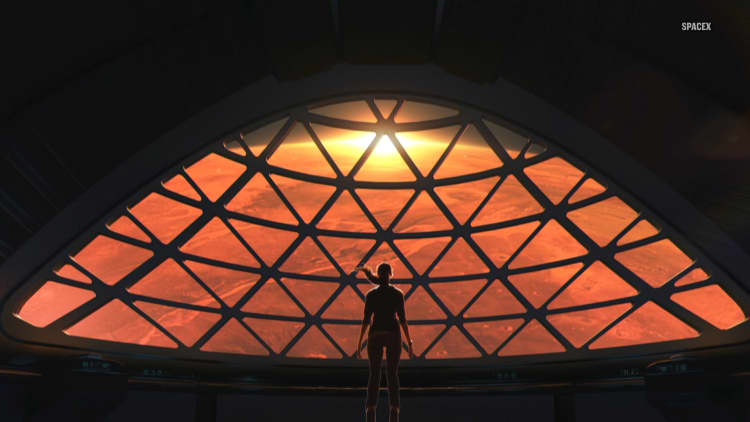Richest man alive Jeff Bezos says Mars is not a place humans would be comfortable living.
"My friends who want to move to Mars? I say, 'Do me a favor, go live on the top of Mount Everest for a year first, and see if you like it — because it's a garden paradise compared to Mars,'" Bezos said at the Yale Club in New York City in February, according to a Business Insider transcript.
That is not to say that Bezos, who founded Amazon and aerospace company Blue Origin, is not interested in sending regular people to space. Bezos says moving to space will become necessary as the population is expanding and Earth's resources are finite. Eventually, an Earth-bound population would face population control and energy rationing, Bezos said.
"...[T]hat to me seems like a pretty bleak world. We don't have to have that," Bezos said.
There are currently over 7.6 billion people on earth, but if space becomes a viable place for humans to live, the solar system has enough resources to support 1 trillion humans, Bezos said. "Then we'd have 1,000 Mozarts and 1,000 Einsteins. Think how incredible and dynamic that civilization will be."
However, said Bezos, "I don't think we'll live on planets." Instead he envisions humans living in self-sufficient space structures, like those designed by Princeton physics professor Gerard O'Neil.
Below is an artist rendering of the exterior of what one of O'Neil's space settlements would look like.
Painting by Rick Guidice courtesy of NASA.
O'Neill's space settlements include two cylinders, each 20 miles long and 4 miles in diameter, according to the National Space Society. Below is an artist rendering of the interior of one of the cylinders.
Painting by Rick Guidice courtesy of NASA.
"The space colonies we'll build will have many advantages. The primary one is that they'll be close to Earth. The transit time and the amount of energy required to move between planets is so high," Bezos said.
"Ultimately what will happen, is this planet will be zoned residential and light industry. We'll have universities here and so on, but we won't do heavy industry here. Why would we? This is the gem of the solar system. Why would we do heavy industry here? It's nonsense."
The artist rendering below is an artist rendering of inside of one of O'Neill's space settlement cylinders, according to the National Space Society.
Painting by Don Davis courtesy of NASA.
Like Bezos, Tesla and SpaceX CEO Elon Musk believes humans will be a multiplanetary species.
"I really believe in the future of space," Musk said on Saturday at the Kennedy Space Center in Florida after the launch of its unmanned rocket ship Crew Dragon. "I think it is important that we become a space-faring civilization and be out there among the stars ... We want the things that are in science fiction novels and movies not be science fiction forever. We want them to be real one day."
However Musk envisions humans "terraforming" Mars, or making the surface inhabitable, so people can live there. It will be extremely risky, says Musk.
Supporting the creation of a permanent, self-sustaining human presence on Mars.
"It's gonna be hard. There's a good chance of death, going in a little can through deep space. You might land successfully, [but] once you land successfully, you'll be working non-stop to build the base — so not much time for leisure.
"And once you get there, even after all this, there's a very harsh environment, so there's a good chance you'll die there. We think you can come back but we're not sure," Musk told Axios in November.
See also:
Elon Musk always thought SpaceX would 'fail' and he'd lose his PayPal millions
Elon Musk defends plans to build a community on Mars after downbeat NASA report
Elon Musk: Moving to Mars will cost less than $500,000, 'maybe even below $100,000'

Like this story? Subscribe to CNBC Make It on YouTube!


